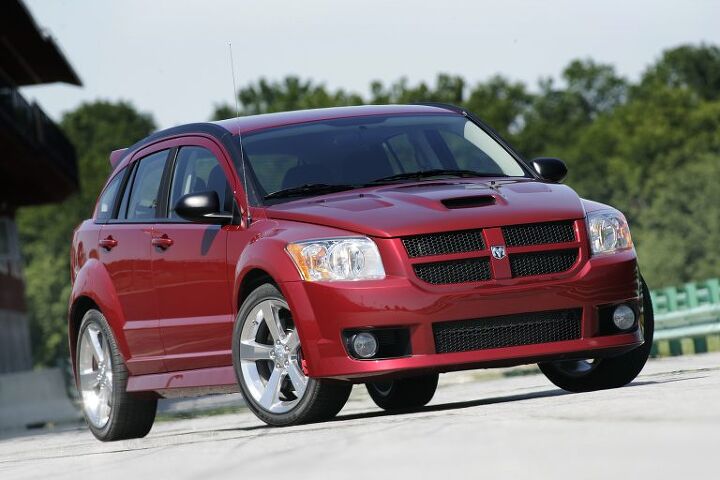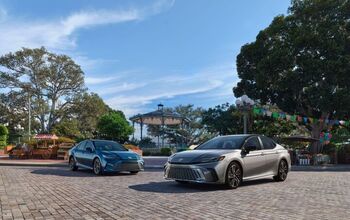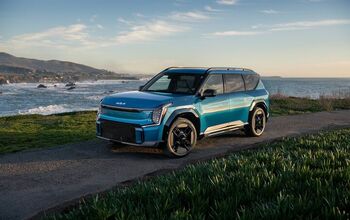Piston Slap: High Caliber Aftermarket Stoppers?

John writes:
Hi Sajeev,
I’ve had a 2009 Dodge Caliber SRT4 for a few years and it’s coming up to its first all-around brake job at 50,000 miles / 80,000 km (I drive like a granny). I work at a dealership (different brand) but can get parts at a bit of a discount. Still, OEM brakes + pads on this thing are $980+tax Canadian. From what I’ve seen I can get aftermarket ones for a quarter of that. One of the mechanics here suggests I put on OEM pads and aftermarket discs.
What do you recommend? Any good aftermarket manufacturers who meet or exceed OEM standards? I know with this car you’ve got the weird fake differential that uses braking to adjust for wheel slip, would non-OEMs eff this up? When I private sale this next year, will having aftermarket brakes effect the resale value with the type of people who buy these cars?
The car has been surprisingly reliable, but I’m only doing 8,000km a year. Debating getting employee pricing on something more…Swedish.
Any advice would be appreciated!
Sajeev answers:
I’d be shocked if Chrysler makes the brake bits that rest in their branded boxes. Brakes, like many other parts, are usually made to OEM specifications by a third party supplier. Which is great, except when it’s not. A few thoughts lifted directly from my experiences:
- Brake pads: high quality ceramic street pads from any parts store (i.e. not the cheapest) stop, leave similar amounts of dust and be silent like an OEM pad. Plus, if you know a bit more about materials, you can choose an aftermarket pad’s composition (organic, ceramic, semi-metallic, full metallic, etc) to tune the brakes to your particular needs. I prefer carbon metallic pads, as I’m easy on the brakes (Houston is flat, and metallics heat up quickly here) and they do an amazing job when I do need them. If not, maybe ceramics are more your speed, so to speak.
- Brake Rotors: Even though the dudes at the parts counter swear that the pricer USA-made rotors are better, I’ve had amazingly good luck with the cheapest, Chinese-made stuff. Perhaps it’s partially because of a friend that tows for a living; he mentioned they are all the same, too. IMO, the USA made stuff has nicer machining around the hub, but that’s about it.
- Brake Rotors II: Avoid the ricey aftermarket slotted/drilled rotors (crack prone) and stick with the conventionally vented units. High Performance cars may have factory drilled/slotted rotors, and if so, stick with OEM just to be safe.
With this in mind, let’s answer your questions:
1) What do you recommend?
Your car’s rear brakes are like any other Caliber, so I’d recommend any high quality ceramic pad on a cheap replacement rotor. Since the fronts are lifted from the Chrysler LX cars, get a cheap LX rotor and your choice of pad. Me personally? Get semi-metallic (carbon metallic) pads all around, especially since a common upgrade for the SRT-4 appears to be the same semi-metallic pad used on the LX Cop Cars.
2) Any good aftermarket manufacturers who meet or exceed OEM standards?
I’m not interested in endorsing one big name pad manufacturer over another for pads. They are all good, and I have yet to regret owning cheap rotors.
3) I know with this car you’ve got the weird fake differential that uses braking to adjust for wheel slip, would non-OEMs eff this up?
I seriously doubt it. But that’s a question for the forums: do some homework, don’t listen to me.
4) When I private sale this next year, will having aftermarket brakes effect the resale value with the type of people who buy these cars?
I think saying that you upgraded to semi metallic pads like the LX Cop Car is a huge plus given the intended buyer. So maybe you should listen to me.
[Image: Dodge/Fiat Chrysler Automobiles]
Send your queries to sajeev@thetruthaboutcars.com. Spare no details and ask for a speedy resolution if you’re in a hurry…but be realistic, and use your make/model specific forums instead of TTAC for more timely advice.

More by Sajeev Mehta
Latest Car Reviews
Read moreLatest Product Reviews
Read moreRecent Comments
- Billyboy The Big Three, or what used to be the Big Three, have been building sedans in the FWD unibody mold since the 80’s to compete with the Japanese - and failing. The Taurus was the only decent attempt, and even that fizzled out after a few years. Back to GM, There’s no reason to choose a Malibu over a Camry or Accord for normal buyers. The story was the same when it was the Citation, Celebrity, Lumina, and Impala, as it was the same with Ford and Chrysler. GM knows this, as does Ford, and doesn’t care - and rightfully so. Better to cede this time-worn commodity segment to others and focus to where the market has shifted.
- CanadaCraig You are not wrong. Or a dummy for that matter. I also think it's foolish of GM to kill off the Malibu. That said... I think there needs to be full-sized plain jane sedans for sale. And there are none. And haven't been for a long time. A basic BIG car. With room for six. Bench seat and all. Nothing fancy. And a low price to go along with it. I would buy one.
- OCcarguy Back in the 1980s the Mitsubishi Cordia was one of my favorite cars. I would love to see them make cars we could get excited about again.
- Chris I dislike SUVs. I think they are clunky looking and not much in the handling department. I'll take an Audi A4 or BMw three series or even a VW Jetta over any SUV. It I need more interior room for a shot time, I'll rent something bigger.
- Amwhalbi I have a sedan and an SUV, and for pure driving and riding enjoyment, I'll pick my sedan every time. But yes, SUV's are generally more practical for all around usage, particularly if you have only one vehicle. So I think the perfect answer is the sedan hatchback (a la the last Buick Regal) which can still yield the drive and ride or a sedan, yet provide a greater modicum of practical, accessible cargo capacity. Most of the sedans made could (with minor styling changes) easily become 4 door hatchbacks. Oh, yeah, I forgot - Americans don't like hatchbacks, even if they do in Europe...


































Comments
Join the conversation
For a non-enthusiast vehicle the formula is pretty simple if you're willing to DIY. Wearever silver pads (full set) + turning the rotors (Often free or cheap, ask an indy who does your harder jobs) + spec brake fluid + coolant since this is usually a great time to replace it. Add in a coupon code or a price match, and your spending will likely be less than $50. Special note... unless you're hard on brakes, most rotors can be turned once. However it can be hard to find shops that still do this. Most auto parts stores no longer provide this service so ask around. If you can't find a place, bite the bullet and have your local parts store price match the Rockauto price.
I'm a little bit late to the party, but a someone who tracks my S2000 and thus goes through brakes like they're going out of style, here's my .02 I don't know if Rock Auto ships to Canada, but if they do I'd check them out for parts. Shipping aside, you should be able to get pads and rotors for all for corners with quality parts for under $250. Brand-wise, I'm partial to Centric. They have high and low-end stuff, ranging from Stoptech to normal Centric, to C-Tek. I'm partial to the Stoptech Street Performance pads since I need the heat capacity for the track, but I only use C-Tek rotors and have yet to have any significant problems. The main 'difference' is painted rotor hats, but since the cheap ones handle track abuse just fine, I don't see the point in the upgrade cost. For your use I'd recommend the following: Pads: For all 4, Centric OE formula $59 or Posi-Quiet Ceramic $63 Rotors: Centric C-Tek rotors $106 for all 4. Upgrading to Centric Premium is another $70. With the right tools and knowledge, It should be about an hour or less of work per axle. While you have it up on the lift it's always a good Idea to flush the fluid as well, as others have said.